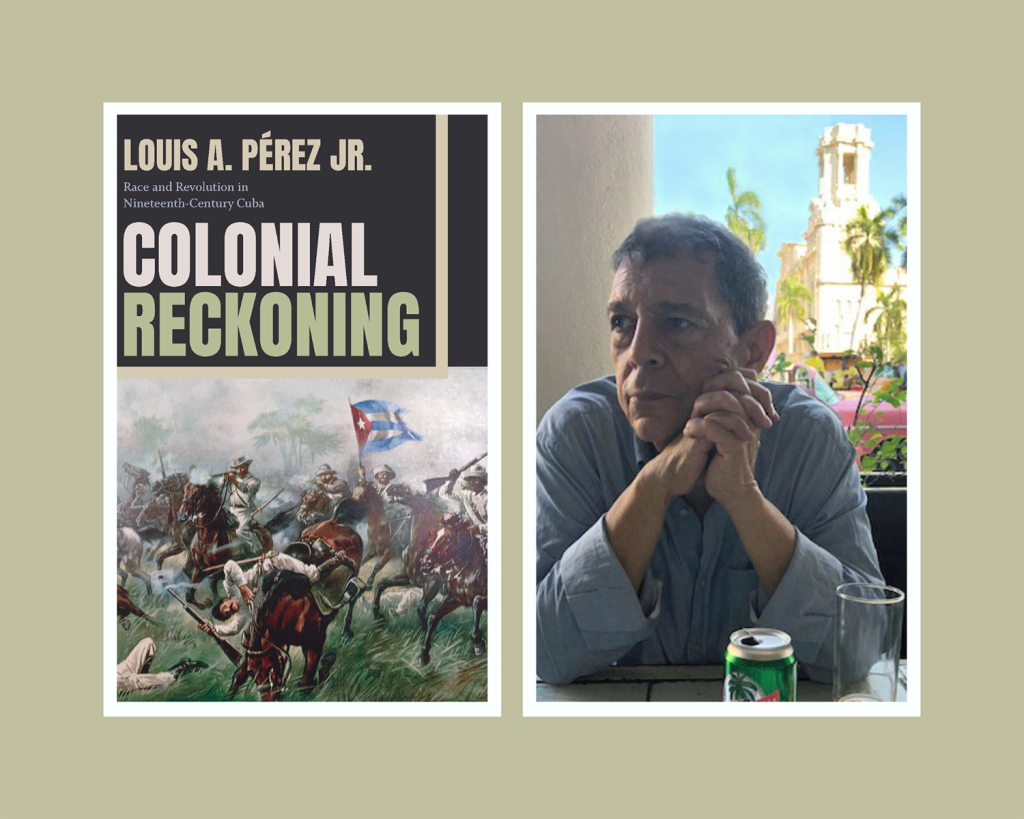Bookmark This is a feature that highlights new books by College of Arts and Sciences faculty and alumni, published each month. The December featured book is Colonial Reckoning: Race and Revolution in Nineteenth-Century Cuba (Duke University Press) by Louis A. Pérez Jr.
 Q: Can you give us a brief synopsis of your book?
Q: Can you give us a brief synopsis of your book?
A: Colonial Reckoning is a study of the formation of Cuban nationhood under conditions of chattel slavery, rebellion and repression, resistance and subjugation. An aroused people are driven to take history into their own hands as a matter of collective purpose, fully persuaded of the righteousness of their claim to a nation of their own as means of being, belonging and becoming. The book underscores the complexities of a national liberation movement expanding — and contracting — in a culture riven with racial animus, ethnic tensions, social panic and national loathing — all converging into recurring wars of fratricidal intensity. Colonial Reckoning examines the meaning of total war waged among combatants and non-combatants alike, warfare waged in the form of spasms of violence and conducted with such frightful ferocity as to suggest an intent of extermination — thereupon to shape all the history that followed.
 Q: How does this fit in with your research interests and passions?
Q: How does this fit in with your research interests and passions?
A: Colonial Reckoning traverses along an arc of inquiry long given to the study of the character of Cuban national formation. That is, a research purpose informed by a determination to re-center an enduring paradigm that often tends to situate much of humanity at the “receiving end” of history. With respect to Cuba, to advance a perspective from which to understand the efforts of a people resolved to persist and prevail, to insert themselves as party to and protagonists in the history of their own making.
Q: What was the original idea that made you think: “There’s a book here?”
A: The original idea came to me at the Estadio Latinoamericano, a stadium in Havana, in 2002, during a baseball game between the host Havana team “Los Industriales” and the visiting team “Cienfuegos Elefantes.” To observe the home-team supporters taunt the fans cheering for the visiting Cienfuegos club, hurling at them verbal epithets of all sorts, but one in particular called my attention: “¡guerrilla!” How very odd, to be in Cuba where the veneration of the guerrilla often assumes the form of practiced reverence. So, why would the home-team fans choose to disparage supporters of the “Elefantes” through the pejorative use of an icon otherwise celebrated as an embodiment of virtue? There was a book there …
Q: What surprised you when researching/writing this book?
A: The craft of history rarely accommodates the experience of surprise in the form of epiphany. New truths are revealed slowly. By degrees. In stages. Over time. Mostly acknowledged — if at all — by way of muted self-murmurs like: “Wow! I did not know that.” Or: “Look at that!” Or: “I’ll be damned!” Perhaps the real surprise comes at the end, with the realization that one has actually finished writing the book after all. Therein lies surprise …
Q: Where’s your go-to writing spot, and how do you deal with writer’s block?
A: The “go-to writing spot: Hmm … mostly at home. Although I occasionally enjoy writing aboard airplanes in flight. About writer’s block: Actually, I have mostly escaped the bane of block in recent years. However, in the past, when confronted by the demons that block writing, I would readily accept defeat. Always the path of least resistance. On those occasions, I would go fishing. Or I would turn my attention to the endless task of cleaning the garage. The advantage of working at home …
Louis A. Pérez Jr. is the J. Carlyle Sitterson Professor of History and the author of numerous books, most recently Rice in the Time of Sugar: The Political Economy of Food in Cuba (UNC Press). Matt D. Childs, author of The 1812 Aponte Rebellion in Cuba and the Struggle against Atlantic Slavery, writes: “Louis A. Pérez Jr. accomplishes what few authors do when covering such well-known topics as Cuban independence: he takes a story we know well and not only provides a new interpretation depth of analysis but reframes it to show that independence was as much a civil war to the death between Cubans as it was a call for ‘Cuba Libre.’”
Looking for more faculty and alumni books to add to your holiday reading (and shopping) list? Check out our fall ’23 College magazine books list!
